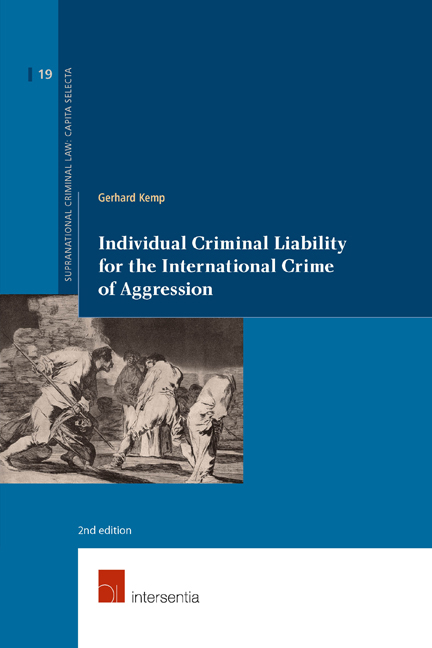Book contents
- Frontmatter
- Foreword to the Second Edition
- Foreword to the First Edition
- Preface
- Contents
- List of Abbreviations
- PART I INTRODUCTION AND FRAMEWORK OF ANALYSIS
- PART II COLLECTIVE SECURITY AND THE JUS CONTRA BELLUM
- PART III THE CRIMINALISATION OF AGGRESSION
- PART IV THE INTERNATIONAL CRIMINAL COURT AND THE CRIME OF AGGRESSION
- PART V NATIONAL AND REGIONAL CRIMINALISATION AND PROSECUTION OF THE CRIME OF AGGRESSION
- PART VI ANNEXES
Preface
Published online by Cambridge University Press: 12 December 2017
- Frontmatter
- Foreword to the Second Edition
- Foreword to the First Edition
- Preface
- Contents
- List of Abbreviations
- PART I INTRODUCTION AND FRAMEWORK OF ANALYSIS
- PART II COLLECTIVE SECURITY AND THE JUS CONTRA BELLUM
- PART III THE CRIMINALISATION OF AGGRESSION
- PART IV THE INTERNATIONAL CRIMINAL COURT AND THE CRIME OF AGGRESSION
- PART V NATIONAL AND REGIONAL CRIMINALISATION AND PROSECUTION OF THE CRIME OF AGGRESSION
- PART VI ANNEXES
Summary
At the time of writing the crises in Syria and Ukraine have gripped the attention of the international media. Both crises caused extensive instability and human misery in some of the most volatile regions of the world. In neither of the two situations the ‘international community’ seemed to be able to find any real solutions. In both situations the use of armed force under international law formed part of the narrative. In Syria's case some presented the use of force as a solution (or at least as part of the solution) in order to stop an immoral and criminal regime from murdering its own people. Others objected to the use of force as a simplistic and prima facie unlawful way to solve a complex situation. In the case of Ukraine the unlawful use of force (including a powerful neighbour's use of armed force by proxy) was presented as the root cause of the conflict.
The UN Charter-based collective security system provides for a strict framework on the prohibition of the use of force. Self-defence and the use of force as per Security Council authorisation are lawful. Other claims to lawfulness, including humanitarian intervention, pre-emptive self-defence and modern versions of the Just War doctrine are not lawful. Thus provides the modern jus contra bellum which emerged in the aftermath of the Second World War.
The crime of aggression is the criminalisation of the unlawful use of force. The quest to find a suitable definition for this most opaque of the so-called core crimes resulted in the Kampala Resolution on the Crime of Aggression, which provides for a definition of aggression and for conditions for the exercise of International Criminal Court jurisdiction over the crime of aggression. The drafting, diplomacy and eventual adoption of the package of proposals constituted an achievement in its own right and a worthy monument to the legacy of Nuremberg; the birthplace of modern international criminal law. But there are significant substantive and jurisdictional limitations that render the Kampala Resolution on the Crime of Aggression perhaps more of a sentimental achievement than any real tool in the quest to end impunity for the most serious crimes under international law.
- Type
- Chapter
- Information
- Publisher: IntersentiaPrint publication year: 2015

